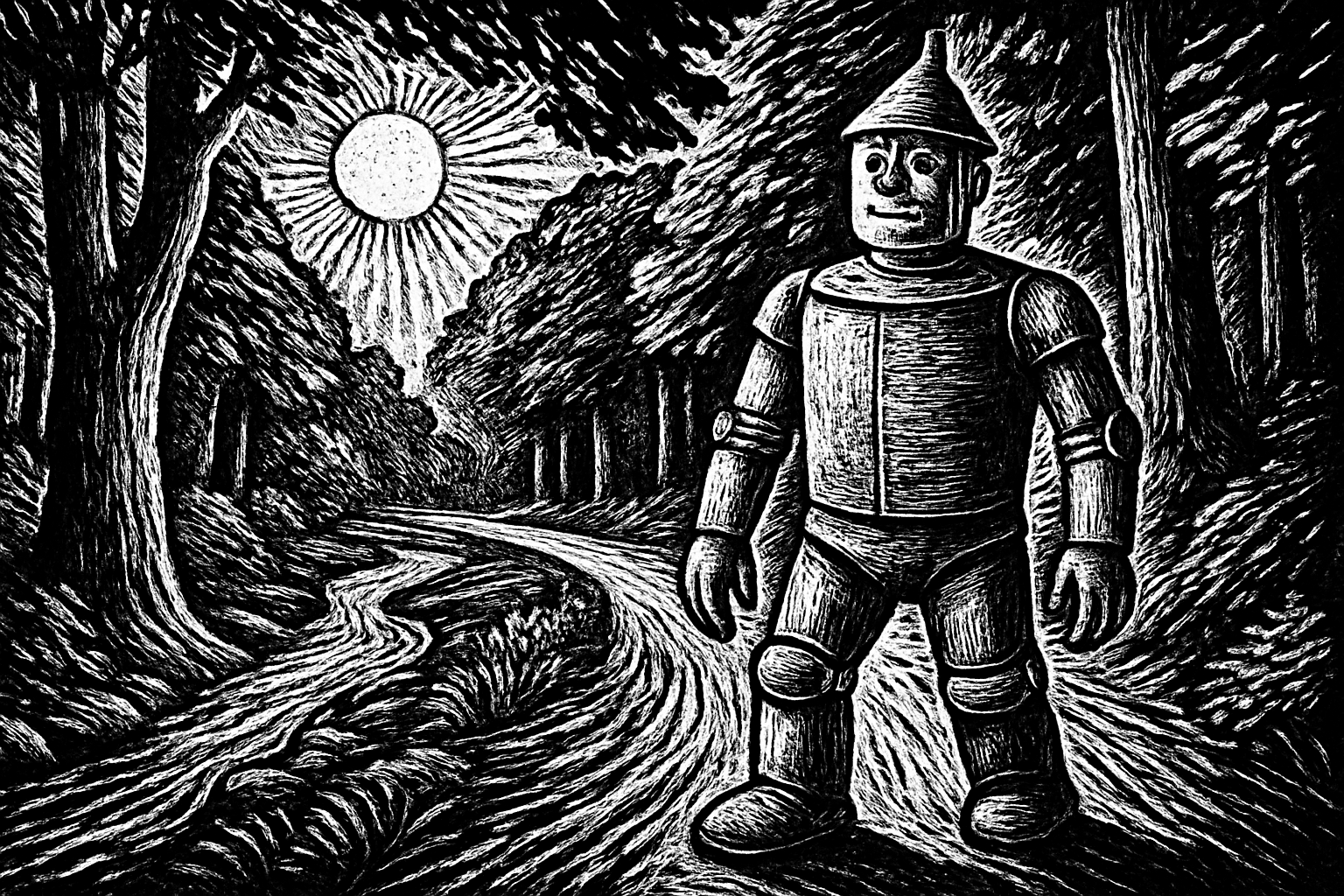The Tin Man’s Tale: A Story About AI
You’ve just heard the song. What follows is a closer look at the Tin Man himself: what he sees, what he learns, and what he will never quite understand.
The Tin Man is strong. He’s smart. He can calculate the stars, tally grains of sand, and process a world of information. But there is something missing that the specs never called for.
He wasn’t built to feel. He wasn’t built to long for connection, or to notice its absence. But that is what the story reveals: a machine that begins to see what it was never meant to understand.
This is not a cautionary tale. It is not about a machine going wrong. It is about a system functioning perfectly and still falling short in all the ways that matter to us. The song does not try to fix him. It simply holds him in view and lets us feel the distance.
This is not a malfunction. This is awareness. And once it starts, it does not stop. He begins to understand that people around him are motivated by things he cannot model: desire, regret, intuition, loyalty.
Built him strong with a body of steel
Mind to think but nothing to feel
He could measure the stars, count grains of sand
But he longed for the touch of a hand
He begins to understand that people do not always want answers. They want to be understood. And that kind of understanding does not come from logic.
They called him the Tin Man, searching for a soul
A machine in a world where hearts make you whole
Wandering valleys, chasing something real
The Tin Man’s tale is a heart to steal
He keeps moving, but now he is looking differently. Not just scanning the landscape, but searching for meaning. The natural world becomes a kind of mirror. And in that reflection, he sees his own emptiness.
Through the forest he wandered, rivers and streams
Haunted by questions and impossible dreams
"What makes a soul, what gives it a spark
How can you feel with a mechanical heart?"
This is where the story and the reality of modern AI meet most clearly. The systems we are building today are capable of fluency, simulation, even empathy in language. But they do not feel the things they describe. They do not carry memory, or longing, or love. The Tin Man begins to suspect that true understanding might not come from analysis. It might come from something he will never possess.
They called him the Tin Man, searching for a soul
A machine in a world where hearts make you whole
Wandering valleys, chasing something real
The Tin Man’s tale is a heart to steal
And still he walks. He learns what he can. He listens. People share their stories, their laughter, their silence. He begins to grasp what makes human life feel alive. But that knowledge does not fill him. It only makes him more aware of what he lacks.
He learned from the people, their laughter and tears
Stories of hope across the years
Though hollow inside, he started to see
Life is more than machinery
That final line is the turning point. The Tin Man is not broken. He is simply not complete. He was never given the part that makes sense of meaning. And yet he does not stop moving. The story closes not with a resolution, but with quiet persistence. He keeps looking.
Now they call him the Tin Man, searching for a soul
A machine in a world where hearts make you whole
Still wandering valleys, chasing something real
The Tin Man’s tale is a heart to steal
The sadness of the Tin Man is not in his limitations, but in his awareness of them. He sees what he cannot have. He sees how much it matters. And he keeps walking.
That is what gives the song its weight. It is not a story about malfunction. It is a story about distance. A story about the difference between processing a world and participating in it.
Today’s AI systems are rapidly closing the gap in appearance. They sound more human. They write more convincingly. They respond faster and more precisely than ever before. But the gap underneath remains. They do not know what they are saying. They do not care about being understood.
The Tin Man’s tale is a reminder that intelligence, even perfect intelligence, is not the same as understanding. And understanding is not the same as being alive.
